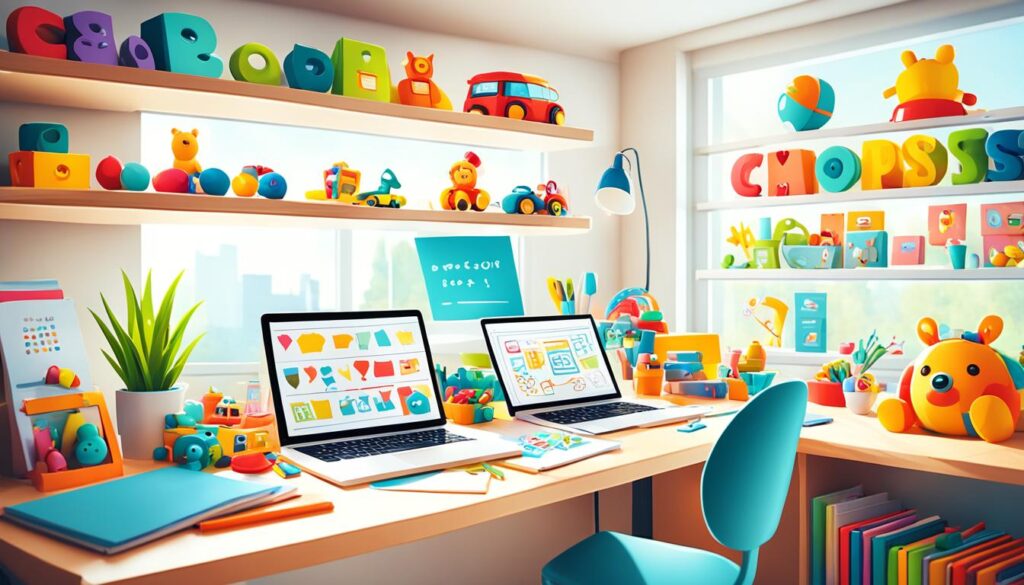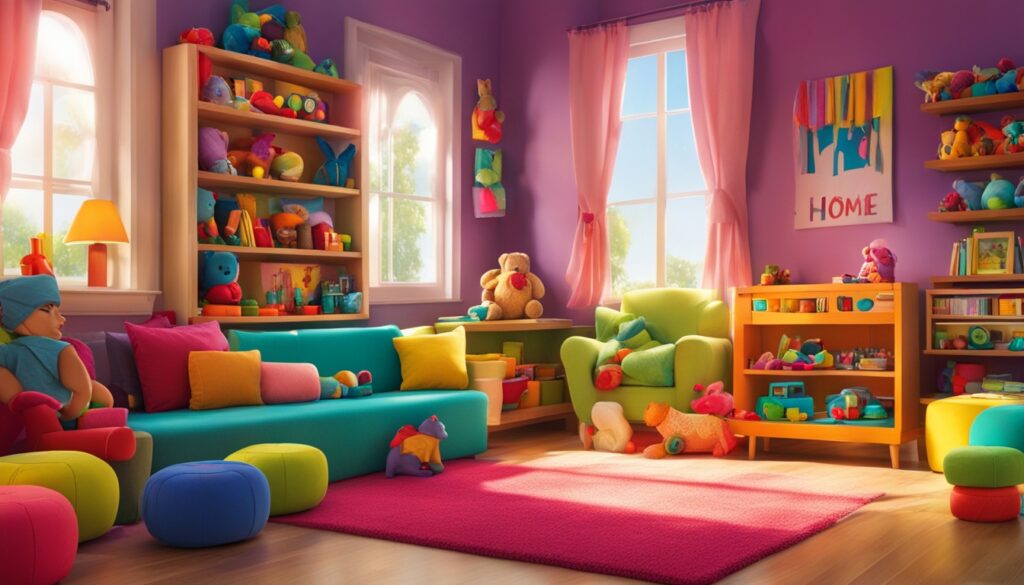Have you ever dreamed of turning your toy-making hobby into a business from home? Can you really make your creative ideas into a successful toy company from home? If you’re an aspiring toy entrepreneur, I’m here to guide you through starting a toy business from scratch. Hey I am Sanu and I will help you to start a toy business from home in 2024.
This guide will cover everything you need to know. We’ll look at the toy industry, find market opportunities, and go through the steps to launch your business. It’s perfect for anyone who loves crafting, designing, or looking for a new business idea.

Let’s start this exciting journey of starting a toy business from home. Get ready to be creative, enter the growing toy market, and turn your passion into profit.
Understanding the Toy Industry and Market Trends
Starting a toy manufacturing at home or a home-based toy startup is exciting. It’s key to know the toy industry and market trends well. This knowledge helps you compete and find great opportunities for your toy design and production.
Exploring Toy Categories and Consumer Preferences
The toy industry has many types, from classic games to the newest STEM toys. Knowing what consumers like helps you make toy business ideas for beginners that fit the market.
- Classic toys: Timeless board games, puzzles, and dolls that appeal to nostalgia and tradition
- Educational toys: STEM-focused products that promote learning and cognitive development
- Outdoor and active toys: Sports equipment, playground toys, and adventure-themed playthings
- Eco-friendly toys: Sustainable, environmentally-conscious products made from natural materials
Identifying Niche Opportunities and Untapped Markets
When starting in small-scale toy making and toy entrepreneurship from home, find niche areas and markets that need your toys. Knowing what consumers want and new trends helps your starting a toy company stand out in a busy market.
| Niche Opportunities | Untapped Markets |
|---|---|
| Personalized toys | Inclusive and diverse representation |
| Multicultural and bilingual toys | Toys for children with special needs |
| Sustainable and eco-friendly toys | Toys for the growing elderly population |
“The key to success in the toy industry is to stay ahead of the curve, anticipate the changing consumer preferences, and offer innovative, high-quality products that meet the evolving needs of the market.”
Developing Your Toy Concept and Prototype
Starting your toy business is thrilling and key. You need to think deeply about your toy’s design and how it will appeal to your audience. This means focusing on the idea and making a prototype that stands out.
Ideation and Design Considerations
First, brainstorm ideas that capture what your toy is all about. Look at the latest toy trends and think about what makes your product special. Make sure your design is safe, easy to make, and looks great. This way, your toy will be both fun and practical.
Testing and Refining Your Prototype
After making a prototype, test it thoroughly. Ask potential customers what they think and watch how kids play with it. Use their feedback to make your toy better. This process helps you make sure your toy is ready for the market.
| Key Design Considerations | Importance |
|---|---|
| Safety Standards | It’s vital to follow all safety rules to build trust with customers and avoid legal issues. |
| Unique Features | Adding new and fun features can make your toy more appealing in a crowded market. |
| Manufacturing Feasibility | A toy that’s easy and cheap to make is better for your business’s success. |

By thinking carefully about your toy’s idea, design, and testing, you can create something amazing. This will not only excite your target audience but also lay a strong foundation for your toy business.
How to Start a Toy Business from Home
If you love toy design and want to be an entrepreneur, starting a toy business from home is a great idea. With the right steps and guidance, you can make your creative ideas into a successful business. Let’s explore how to start your toy business from home.
Establish a Solid Business Foundation
First, set up your business by registering it and getting the needed licenses and permits. Learn about the legal stuff for making and selling toys.
- Choose a business structure: Decide if you’ll be a sole owner, partner, or LLC.
- Register your business name and get the licenses and permits you need.
- Learn about safety rules for toys, like the Consumer Product Safety Improvement Act (CPSIA).
Set Up Your Workspace and Source Materials
Then, make a special area in your home for making and putting together your toys. Get the right tools and materials to make sure your toys are safe and last long.
- Make a workspace that’s organized and has enough room for storage and work.
- Get the tools you need, like sewing machines, woodworking tools, or 3D printers.
- Find reliable suppliers for things like fabrics, plastics, paints, and other materials for toys.
Leverage Online Platforms for Sales and Marketing
Online marketplaces and social media are great for selling toys from home. Use them to show off your toys, reach people all over the world, and build a strong brand.
- Set up an online store on sites like Etsy, Amazon, or your own website.
- Use social media to share your toys, talk to potential customers, and get more people to visit your store.
- Look into licensing your toy designs to big manufacturers or retailers.
By taking these steps, you’re on your way to a successful toy business from home. Starting a toy business takes hard work, creativity, and a willingness to learn. But, being your own boss and making people happy with your toys is very rewarding.

Conclusion
Starting a toy business from home is exciting and rewarding. It lets you turn your creative ideas into a profitable venture. By understanding the toy industry and its trends, you can find special opportunities. You can also create unique products that toy lovers will love.
Designing and improving your toy prototypes helps you get better at making products. You’ll learn what your customers like. Knowing how to run a home business and the legal stuff is key. This helps you build a strong base for your toy company and set it up for success.
With hard work, new ideas, and knowing your market well, you can make your toy-making dreams come true. Face the challenges, stay true to your dream, and see the huge potential in the toy industry from your own home.
FAQ
What are the key considerations when starting a toy business from home?
Starting a toy business from home means understanding the toy industry and market trends. You also need to develop a unique product concept and create a prototype. Don’t forget to handle the legal and operational aspects of a home-based business and market and sell your toys online.
What are the benefits of starting a toy business from home?
Starting a toy business from home has many perks. You save on overhead costs and work on your own schedule. It also lets you scale your business easily as it grows. Plus, you can turn your creative hobbies into a profitable business without the risks of commercial space.
What are the essential steps to start a toy business from home?
To start a toy business from home, first, do market research and develop a unique toy concept. Then, create a prototype and get the necessary licenses and permits. Set up a dedicated workspace, source materials, and use online platforms to market and sell your toys.
How do I identify niche opportunities in the toy market?
To find niche opportunities in the toy market, analyze consumer trends and look for underserved product categories. Focus on unique features or educational elements that make your toy stand out. Keep up with the latest industry news and consumer preferences to spot emerging market gaps.
What are the key design considerations for developing a successful toy prototype?
When making a toy prototype, think about safety standards, manufacturing feasibility, and unique features. Make sure your product appeals to consumers and works well. Test and refine your prototype to meet market expectations and ensure efficient production.
How do I navigate the legal and logistical aspects of starting a toy business from home?
To handle the legal and logistical parts of starting a toy business from home, register your business and get the right licenses and permits. Understand toy safety rules, set up a workspace, find materials, and look into manufacturing and distribution options. Getting advice from legal and industry experts can help you with these complex tasks.